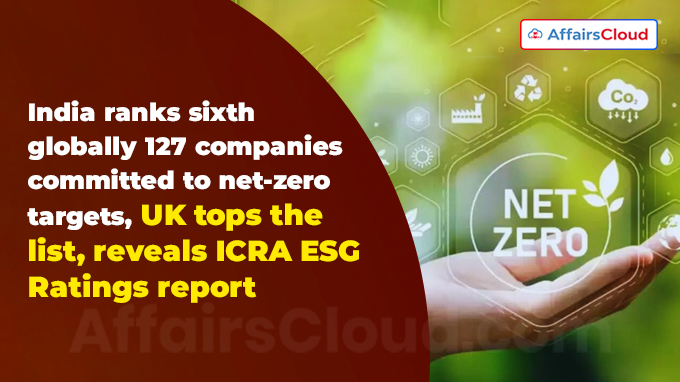 According to the report on ‘SBTi commitments by Indian companies’ released by the ICRA ESG Ratings Limited (formerly known as Pragati Development Consulting Services Limited), India has secured the 6th spot globally in corporate climate action with 127 companies committed to net-zero targets under the Science-Based Target initiative (SBTi).
According to the report on ‘SBTi commitments by Indian companies’ released by the ICRA ESG Ratings Limited (formerly known as Pragati Development Consulting Services Limited), India has secured the 6th spot globally in corporate climate action with 127 companies committed to net-zero targets under the Science-Based Target initiative (SBTi).
- The United Kingdom (UK) topped the list with 702 companies committed to SBTi targets, followed by the United States of America (USA) with 425 companies in 2nd place. China ranked 3rd with 233 companies, while Germany secured 4th place with 203 companies. Sweden with 143 companies in 5th place.
- China, the largest global emitter, has less corporate adoption despite contributing 27% of global emissions.
Note: SBTi is a voluntary target-setting initiative wherein companies can commit to setting science-based targets and have their objectives independently analyzed and validated.
Key Highlights:
i.The report shows that though India is contributing approximately 7% of global emissions, its corporate commitments reflect a growing awareness, though high-emission sectors like power, energy, and cement are still behind in adopting such goals.
- It has also showed that less than 10% of firms from these high-emission sectors, which comprise 55% of India’s overall greenhouse gas emissions, have adopted net- zero targets.
ii.Considering approximately 25 companies from power, cement, and mining sectors have committed to emission reduction through SBTi.
- The report has observed that coal-based power generation continues to dominate the energy mix, though companies are shifting towards renewable energy with net-zero commitments.
iii.As per the report, six Indian power sector companies have adopted SBTi targets, with three operating primarily in Renewable Energy(RE).
- Adani Energy Solutions Limited achieved an 11% reduction in absolute emissions while JSW Energy Limited maintained stable emissions due to its focus on sustainability measures such as waste heat recovery systems.
- Tata Power Company Limited saw a 15% increase in emissions between Financial Year 2018-19(FY19) and FY24 due to increased use of electricity and expanding production capacities.
iv.The cement sector which is considered to be a significant emitter is adopting alternative fuels such as biomass and implementing carbon capture technologies to mitigate emissions.
- Companies with net-zero commitments in the metals and mining sectors have shown higher adoption of sustainable practices but the progress remains uneven.
Global Scenario:
i.The report stated that around 9,000 companies globally have committed to emission reduction targets, with around 3,500 specifically targeting net-zero emissions.
- Europe leads with 2,998 firms, followed by Asia at 1,846.
ii.India has also shown significant improvement within the BRICS bloc, where it, along with China, contributes over 90% of emissions.
- During the 1st Quarter(Q1) of FY24 alone, BRICS nations emitted 1.98 billion metric tonnes of Carbon Dioxide (CO2) from the power and energy sectors, driven largely by coal usage.
Recent Related News:
According to the Vancouver (Canada)-based public policy research organisation Fraser Institute’s latest report titled “Economic Freedom of the World (EFW) 2024 Annual Report, Hong Kong Special Administrative Region (SAR), People’s Republic of China, with ratings of 8.58, has reclaimed title as the world’s largest freest economy from Singapore, which has been ranked at 2nd position with overall ratings of 8.55.
- India has improved its ranking by 3 places, from 87th (In EFW 2023) to 84th (In EFW 2024) with the ratings of 6.58.
About ICRA ESG Ratings Limited:
Managing Director (MD) & Chief Executive Officer (CEO)- Ramnath Krishnan
Headquarters – New Delhi, Delhi
Founded – 1991




